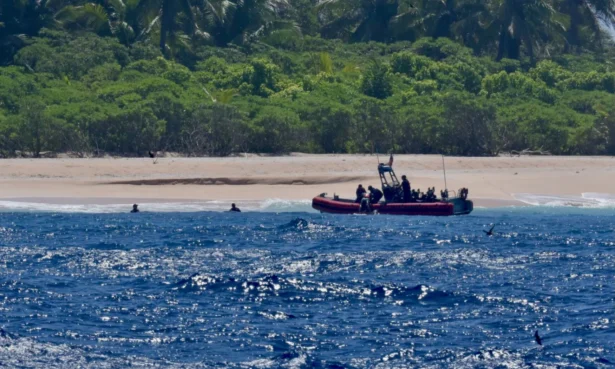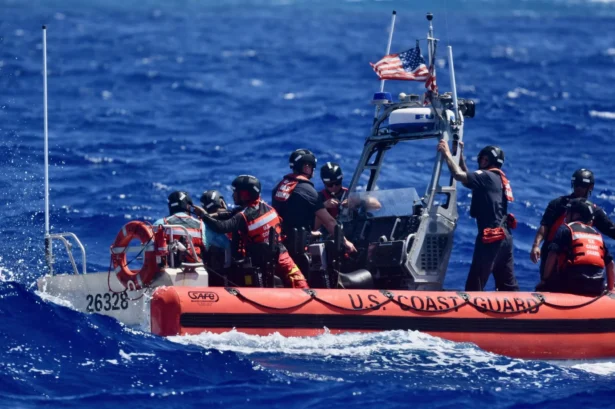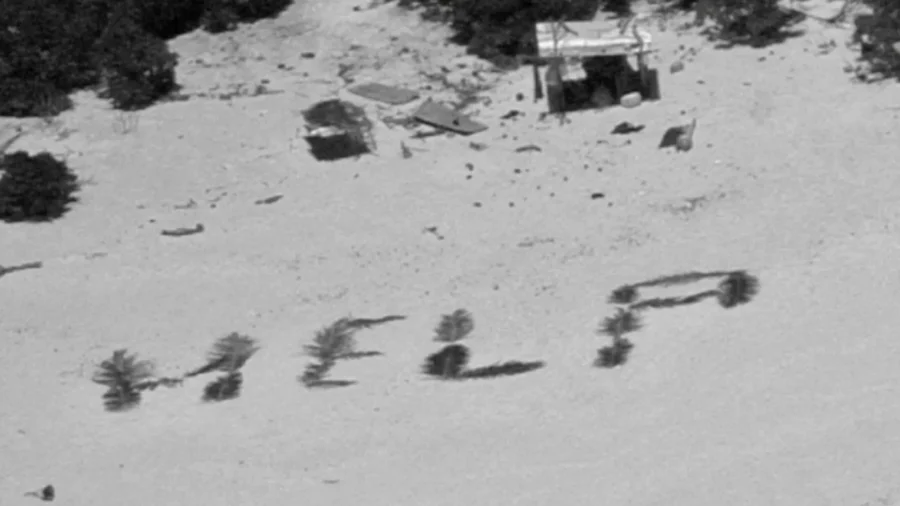A group of sailors who had been stranded on a remote atoll in the Pacific Ocean for more than a week have been rescued after officials spotted a “HELP” sign they spelled out with palm leaves on the beach.
In a press release issued on April 9, the U.S. Coast Guard (USCG) said a family member of the three mariners, who have not been identified but are all men in their 40s, notified the Joint Rescue Sub-Center in Guam on April 6 to report that her uncles had not returned from their voyage from Polowat Atoll, which is approximately 100 nautical miles southeast of Pikelot.
The castaways, all experienced in navigating the waters in the area, had embarked on their journey on March 31 in a 20-foot open skiff equipped with an outboard motor, according to the USCG.
Officials immediately mobilized a search and rescue operation after the mariners’ niece reported them missing. The initial search area spanned more than 78,000 square nautical miles.
A breakthrough in the operation came when the crew of a U.S. Navy P-8 Poseidon jet, dispatched from Kadena Air Base in Japan, spotted the palm frond sign on April 7, confirming the presence and condition of the men.
“The mariners confirmed they were in good health, had access to food and water, and recovered their skiff, which unfortunately sustained damage, rendering it and its outboard engine non-functional,” the USCG said. “They expressed a desire for assistance in returning to Polowat.”
A USCG spokeswoman said the men lived off coconut meat and had access to fresh water from a well on the island, Stars and Stripes reported. Fishermen sometimes visit some of the many islands in the region.
Crew members of the P-8 Poseidon dropped survival packages onto the island on April 7 to sustain the men until further assistance could arrive to pick them up.
On April 8, a USCG search and rescue aircraft from Hawaii also dropped a radio to establish communication because the trio’s radio ran out of power before they could call for help.
On the morning of April 9, the USCG’s Oliver Henry rendezvoused with the men on Pikelot—a tiny teardrop-shaped uninhabited island part of the Federated States of Micronesia—and returned them to Polowat with their equipment.
‘Slightly Dehydrated’
“In a remarkable testament to their will to be found, the mariners spelled out “HELP” on the beach using palm leaves, a crucial factor in their discovery. This act of ingenuity was pivotal in guiding rescue efforts directly to their location,” Lt. Chelsea Garcia, the search and rescue mission’s coordinator, said on the day they were located by the P-8 Poseidon’s crew.
“This successful operation underscores the effective coordination and partnership between the U.S. Coast Guard, the U.S. Navy, and regional partners,” she added.
Chief Warrant Officer Sara Muir of Coast Guard Forces Micronesia told Stars and Stripes that the men were “slightly dehydrated” before crews dropped survival packages. She also said they didn’t have enough food to survive much longer.

“Their initial goal was to fish around Pikelot, but the skiff was damaged when they approached the island due to the swells surging on the island and surrounding shoal,” Ms. Muir said. “They were originally going to meet up with another family from Satawal [Atoll] at Pikelot. The Satawal family ended up not going due to weather and sea conditions.”

In its statement, the USCG strongly recommends all mariners equip their vessels with an emergency position-indicating radio beacon, or EPIRB, which is a tracking device capable of quickly alerting authorities to the location of castaways or people in distress.
They are installed on ships and other vessels after being registered with the national search and rescue forces to that boat. The registration allows confirmation of false alerts and faster and quicker rescue operations in emergencies.

